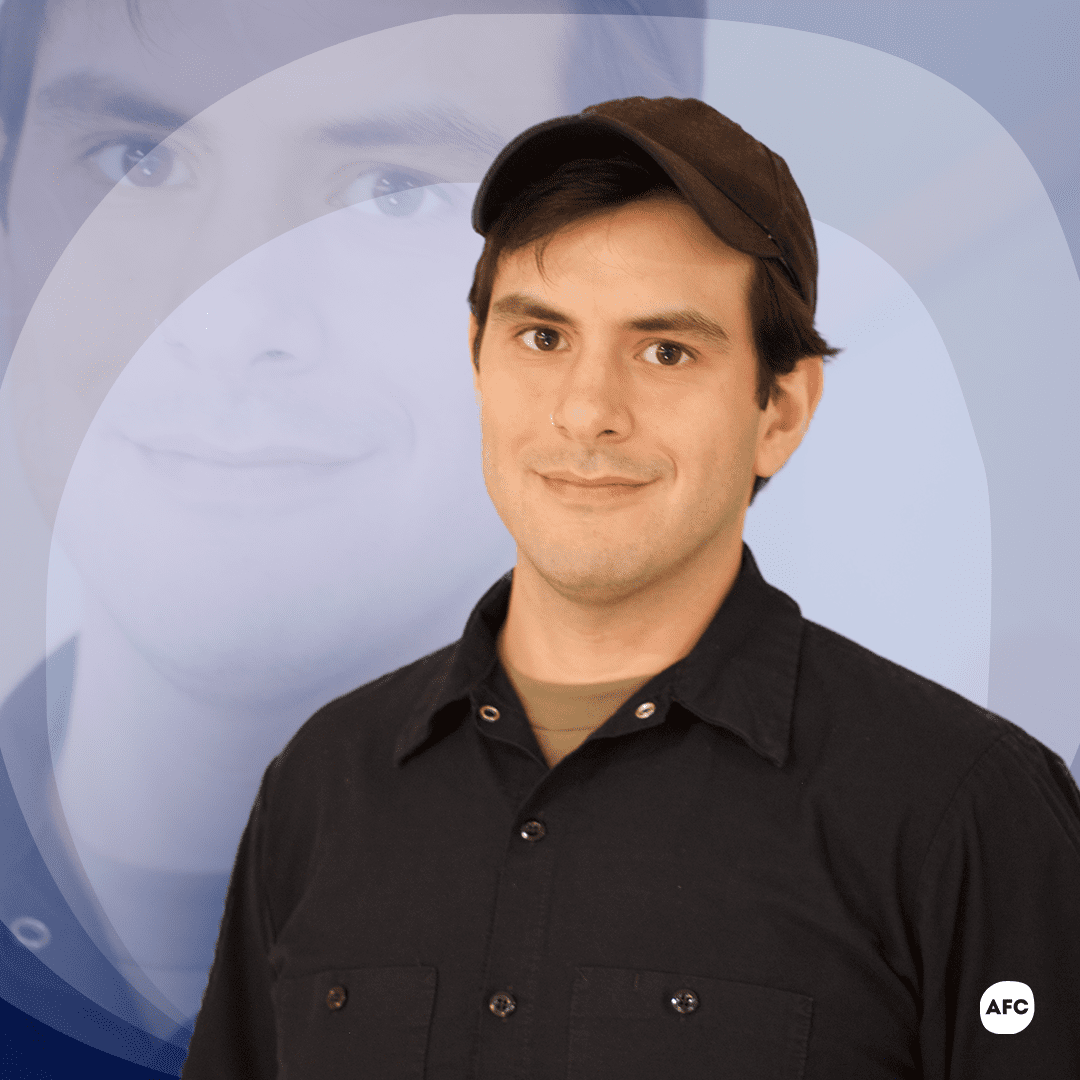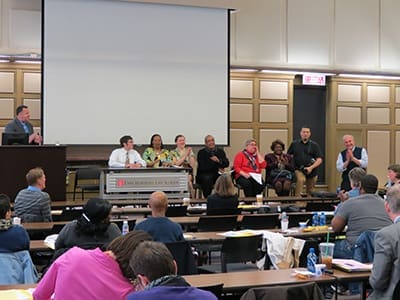By Diego Roman, Communications Specialist
This week marks the 33rd Anniversary for the Ryan White CARE Act, which provides HIV treatment, care and services to low-income individuals living with HIV. This act is crucial to ending the HIV epidemic, as it aids those in greatest need with medical care, food, and even housing.
In honor of this anniversary, I sat down with the newest member of the AIDS Foundation Chicago Care Team, Ryan White medical case manager Jose Estrada (they/them). Jose has been at AFC for nearly 8 months now, specializing in Medical Case Management. Case managers work closely with clients to assist them with a wide range of services. During our discussion we covered many challenges that case managers face including, offering adequate support to AFC’s Black & Latine clients, and the crucial services our Care Team provides.
Can you tell me a little bit about your work history and how you made your way to AFC?
Jose Estrada: I sort of fell into nonprofit work. I graduated in winter of 2019 with a degree in English, and I really did not have any goal post-graduation. I was just, like, “OK, I just better get a job!”
I began working for Lutheran Social Services of Wisconsin and Upper Michigan at a men’s drug rehab facility. Those clients were previously incarcerated people (which is a vulnerable community). I was able to utilize my English degree and my communication minor through my capacity to listen to people and interpret their needs.
I stayed there for a year and a half and then got into harm reduction services with Sixteenth Street Community Health Center in Milwaukee, Wisconsin. I began providing syringe exchange other services for people who inject drugs. I engaged with people who had varying degrees of stable housing. I was also doing Narcan trainings and donation drives.
It was productive, but I was very underpaid… grossly underpaid. I just took a chance and applied to certain places I wanted [to work for]. I attempted to stay in Wisconsin, but I got an offer in Chicago at AFC. And that’s how I ended up here.
This month marks the 33rd year since the Ryan White CARE Act was introduced.
As a case manager, how crucial is the Ryan White CARE Act to people living with HIV in Chicago?
Jose Estrada: Well, out of the whole Care team, I’m the newest one. I just want to acknowledge that I’m not a complete expert.
I find the Ryan White CARE Act to be essential to the goal of reducing HIV transmission, especially among Black communities and communities of color. There are social and cultural factors that make HIV still prolific within these communities.
Case management services really help people navigate these really daunting systems. Sometimes, our job focuses on providing that support and that encouragement. Our goals are to have clients reach self-sufficiency regarding their HIV care.
I believe case management to be one of the most essential departments alongside medical care and housing. It is a crucial component to ensure that people remain virally suppressed, (meaning the virus cannot multiply or hurt their immune system and make its extremely unlikely to be passed on to others), remain engaged in care, and for people to feel visible and empowered.
What does a day to day look like for you as a case manager?
Jose Estrada: My day usually starts with me contacting clients; sometimes I will have a client call me or text me first thing in the morning saying, “Call me when you can.” Sometimes, it might be to address a need, or it just might be just them informing me about how they are doing with their own goals, and it’s just them wanting to keep me in the know.
I may also fill out referrals for needs such as access to the food pantry or oral health and keeping up with clients to make sure they are up to date with their lab work specific to their HIV-related health.
There are some days that a client might need a little more help or might require a more in-depth discussion about medication adherence, substance use or harm reduction. Sometimes [we meet] in person. Sometimes we refer to their individualized care plans.
As medical case managers, we collaborate alongside our clients to develop goals through an individualized care plan, checking in on a monthly basis to discuss the progress of their goal and address any new needs.
What’s it like to give back to your community as a Latine person in such a direct way?
Jose Estrada: I grew up on in a town in Texas alongside the Texas-Mexico border, so I identify as Tejano. My family has been in that region for so much history, including during the time when the area was a part of Mexico and in the time since it’s has been Texas. I think being Latine, specifically Tejano, brings an aspect of empathy, or at least with me it does within my role as a case manager.
I have privilege through my education and my capacity to be trauma informed. For example, aggression from people of color can seem like such a hostile thing. Through a trauma informed lens, that same hostility, or frustration, or anger can be identified as a trauma response or symptom of mental health challenges.
It is very important as a person of color to continue to have people of lived experience and similar backgrounds in these roles as case managers because they reflect the experiences and backgrounds of our Ryan White clients. I cannot emphasize enough the importance of considering these facts when filling these positions for case management services.
For me, my experience growing up was like many of the clients I serve. Most of my community’s mindset growing up was different. My queerness in a small town was not always accepted, and I had personal difficulties with barriers accessing sexual health information and services specific to me.
I do not view people that live with HIV as charity cases or someone to look down on. Being Tejano and nonbinary, I have been kicked around a lot of times. That is why I do my best to ensure that my clients do not feel stigmatized when engaging with me.
What would you say is the biggest struggle that people may not know about being a case manager?
Jose Estrada: It comes down to how to persevere and sustain that emotional bandwidth we must utilize; that invisible labor that we as case managers do. I do my best to advocate for myself and for my coworkers, who are some of the best people I have worked with.
We must acknowledge the labor and the distress our work can cause us as workers in this field. Yes, it is important to have separation between yourself and the client. But we are human, and we want to listen to their stories as professionals offering services.
Clients can be experiencing housing issues, engaging in sex work for survival, or even relapse. I view it as a duty to listen, you know? That comes with a cost, and sometimes that can take some energy out of you because it requires effort to listen and empathize with our clients’ experiences.
I think some of the biggest challenges are just trying to find that balance. We must be able to find that space for peace to just really rest and continue to sustain ourselves. Burnout is something that happens in nonprofits very frequently.
If you had to convince someone to become a case manager, what would be your big pitch?
Jose Estrada: I think it is hard to convince people. My fellow colleagues and I all found our personal investment in this field. We all find a reason individually for why we do the work that we do.
I have met people at previous jobs, and it was clear that they thought what we were doing was an easy job. We were doing outreach and HIV testing. But they were missing the other components to the job to make it more effective. HIV testing is important, but it is also a vehicle for conversation, and a window to access information [related to HIV and sexual health]. It is an opportunity to connect communities to resources and tools, and they did not understand that.
This job is not for everyone, but I do believe that there are a lot of people out there that have the potential to be great case managers, social workers, or counselors. They just need to receive access to more opportunities and resources for career development.
Are there any other Ryan White Case Managers or AFC employees that you’ve worked with that you want to highlight?
Jose Estrada: The whole team, really. You need to highlight the whole team.
I obviously want to give a big shout to Lakethia Patterson for taking a chance on me and bringing me into the fold.
I can honestly say that every individual on the care team has helped me in some way. I probably say it too much, but in every meeting, I say, “I appreciate y’all” and I truly mean it. From the medical care team, Ruthie Rodriguez and Kayla Dillard have been extremely helpful. They have been the ones that were helping me the most, teaching and guiding me along the way while I was beginning my position at AFC.
But like I said, everyone deserves a spotlight. That is one thing about this job, too, that I love. We all do this job with humility. We do not do it for praise. We do our work because we see a need to. We do it to support our clients and community members living with HIV.
Do you have any significant stories or clients that have touched your heart or meant a lot to you in any sort of way?
Jose Estrada: Obviously with respect to people’s privacy and HIPAA, I will not name people. I am not going to lie and say I do not cry with client sometimes or after I have talked to a client.
I think there is strength in vulnerability. That goes for me, and for my clients. I have clients in recovery for substance use. I have told them that I am in recovery too. I disclose that because I want them to know that I am not a person looking at them like an alien, as if I am unfamiliar with their experience. I want them to get that I can empathize and understand what they are going through.
I have clients telling me they have a job interview, or they got their driver’s permit, or they got housing. I love hearing little things like that, whenever there is something successful, however minimal it might seem.
It comes down to knowing that clients can and will trust us, because I know trust is so fragile. When I am aware they are beginning to trust me, I take that very seriously. It gives me the drive to continue with this work.




